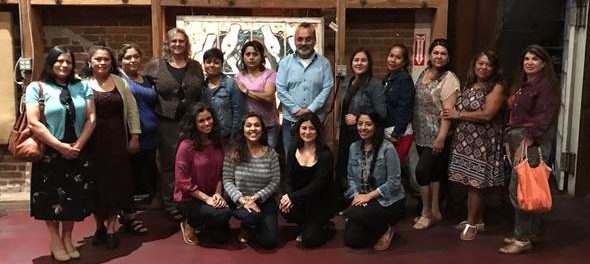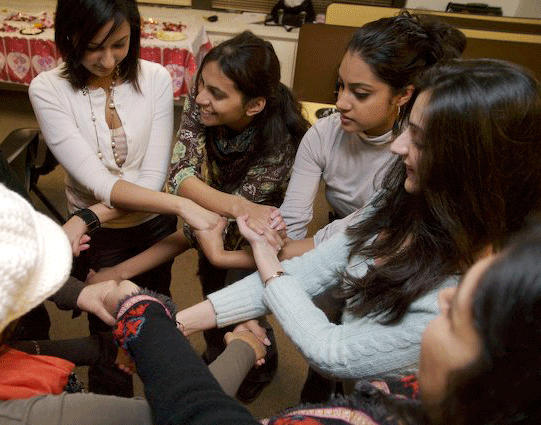What is Convivencias?
Humanidad addresses the stigma associated with seeking mental health services through its use of Convivencia model; a space of familismo (family), respeto (respect), and personalismo (relationships), where community members feel safe to engage in storytelling and share life experiences while learning from others.
The strategies being integrated include culturally relevant community events (Community Convivencias) and group counseling (Group Convivencias), both with the main purpose to increase a sense of belonging, self-esteem, and a quality of life.

Community Convivencia
A two hour community gathering…
> Where community members learn about Humanidad and emotional health.
> To break the silence and stigma around mental health.
> Where families with similar backgrounds receive mutual support and talk about their health and experiences.
> Celebration of cultures, food and raffles are offered.

Group Convivencia
An 8-week youth support group for participating high schools where participants…
> Reflect on their life experiences and important relationships in their lives.
> Meet others who are going through similar life struggles.
> Receive mutual support from others.
> Learn about themselves and get support.

Overcoming Challenges
In the Latinx culture, there is a strong value to socializing, as well as a more relaxed sense of time. There is a different lifestyle in the American culture, where individuals are more individualized and everything is on a schedule. Latinx individuals usually find themselves in isolation when living in the United States. Through connecting and relating is how therapists are able to reach out to the Latinx Community. Within this community, there is resistance to mental health, which has been a barrier for recruitment for Convivencias. However, we are noticing that Humanidad as well as Convivencias are beginning to be known in the community.
Through word of mouth- by sharing experiences of past Convivencia participants, and hearing from trusted professionals about Convivencias- we have been able to reduce stigma and recruit more participants. There have been other barriers involved where participants haven’t been able to commit to Convivencias, such as a lack of transportation or child-care, work schedules, and financial barriers. By being aware of this, Humanidad has been able to build relationships with community partners, in order to provide an accessible space for participants.
Convivencia Model As a Mental Health Intervention
The Convivencia model is culturally relevant because it is a practice that has embraced for generations, as a way to come together.



> It encourages peer-to-peer support.
> Promotes inclusion and access to mental health by engaging Latinx individuals, families, school communities and other co mmunity members in a non-threatening practice that is culturally understood and accepted.
> The Convivencia model is unique within HTES because it allows the conversation about mental health to emerge without fear or judgment.
> This process of coming together with those who have garnered trust and respect and who support, challenge, understand, empathize and show compassion, is experienced in the quality of connection, community, dialogue, inclusivity, and engagement. We see these attributes of Conviviendo as opportunities for depth-oriented individual and family therapy, and as a way to bring together both humanistic and traditional indigenous practices as critical components of this intervention.
Outcomes & Testimonies
Data from local evaluations show:
• 51% of participants report Convivencias helped them understand themselves through hearing and sharing stories.
• 74% of participants feel safe and welcomed when participating in Convivencias
• 53% of participants feel comfortable talking about their problems with members of Convivencias.
• 70% of participants feel great after participating in Convivencias.
• 67% of participants feel like they have a voice and members of HTES understand them.
• 70% of participants feel their point of view as Latinx is understood in Convivencias.
• 65% of participants feel respected by their mental health beliefs and their preference in types of treatment.
• 66% of participants feel their personal needs are taken into consideration in Convivencias.
• 70% of participants have been offered free or low-cost services by HTES.
Through the Convivencia model, participants have reported in the local evaluation:
> Connection, community building, support, shared experiences, and resilience.
> Participants have decided to begin individual therapy after being a part of Convivencias.
Next Steps
Get all of the Convivencias information

